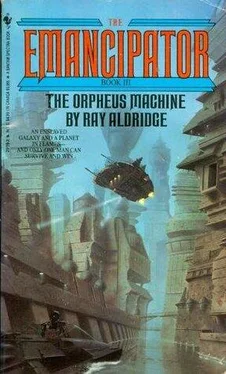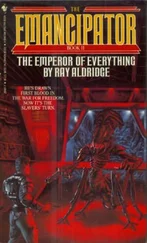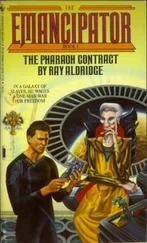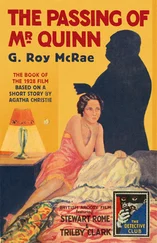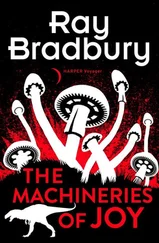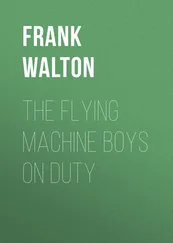Flomel presented his tricks with many an elaborate flourish, and in his expressions Ruiz saw nothing but the pleasure of this familiar work. When he was finished, he came over to them, mopping sweat from his brow with a new silk scarf. “Ah, they know quality when they see it, for all their unsophistication. Eh?”
“I’m sure,” said Ruiz.
Flomel smiled and then looked a bit uncertain. “I would ask a favor of you, Ruiz Aw.”
“What?”
“I’d stay here, if I could.”
“Certainly,” said Ruiz. “But I think I can return you — and Dolmaero — to Pharaoh, if that is your wish.”
Flomel looked faintly regretful, but then he shook his head. “If that’s your plan, only a fool would doubt that you can do as you say — and I’ve decided to retire from fool-hood. No, I feel no great urge to see Pharaoh again. I crave a less exciting life. This seems a quiet and unremarkable place. Perfect for me.”
Ruiz nodded. “All right.”
Flomel smiled, his hard narrow face full of light.
Ruiz bought an old but well-maintained airboat, which carried them uneventfully to the Blacktear Pens, where Ruiz appropriated Corean’s fine little starboat, the Sinverguenza.
The slaver’s household had fallen into disarray during her absence, so Ruiz allowed her to retake control of her enterprises. Unfortunately, the remaining members of Dolmaero’s troupe had disappeared, sold away or otherwise lost. For a while Ruiz feared that they would lose Dolmaero, too, who was at first inconsolable. Ruiz eventually distracted him with stories about the Art League and its manipulations of Pharaohan society, so that Dolmaero’s sorrow soon evolved into a cold determined rage.
When Dolmaero and Nisa were safely aboard the starboat, Ruiz gazed at his former enemy, who waited dead-faced on the blackened alloy of the launch ring.
“There will be no more slaving for you,” he said to her gently. “Set your properties free. Be as kind as possible. And when you have a chance to free someone, do it, as long as you’re not destroyed in the process. Avoid violence. Coerce no one who has not attacked you. Never bother me or any of my friends again.”
He looked at her for a long time. For some reason he could feel no hatred for her — it would be as pointless as hating the dead. “Otherwise, live your life as you choose.”
She nodded her understanding.
The horror of what he had done to her had become less immediate, and now he felt only a sense of cloudy accomplishment, as if he had set a useful machine into motion.
“Good-bye, then,” he said unnecessarily. He went aboard the starboat and lifted away from Sook.
They fell past the Shard orbital platforms and set course for Pharaoh.
The three of them stood on the Worldwall in the dawn chill, looking down into the mists of Hell. Nisa leaned lightly against Ruiz’s shoulder, making a spot of delicious warmth between them.
In the nearby castle, all the Watchers slept at their posts, tranquilized by a sudden swarm of Corean’s mechanical wasps.
Dolmaero retained his ponderous earnestness, though he was much thinner than when he had left Pharaoh. “I don’t understand,” he said slowly. “How can you hide anything down there? Besides, why don’t you just take the slaver’s starboat?”
Ruiz smiled at the Guildmaster. “I’m fond of my own little ship; I couldn’t leave her to rot. As for the Sinverguenza… well, I give it to you. Perhaps you’ll become a famous star pirate.”
Dolmaero snorted; his jowls quivered, as if he were suppressing laughter with some difficulty. “What will I do with a starboat? I cannot pilot it, and if I could, I wouldn’t know where to take it.”
“No difficulty there,” said Ruiz. “The boat has a Bansh revenant for a pilot. You say ‘Take me to Dilvermoon’ and it takes you. Or ‘Take me to Stegatum.’ Or Take me to the palace.’ If you don’t know where to go, say, ‘Where can we go, that has green seas, coconuts, and friendly natives?’ Or ‘Where can we go to sell a conjuring act into a limited contract? Where can we find a reliable bank?’ Or, when you’re ready, ‘Where do we go to apply for membership in the pangalac worlds?’ The ship will tell you anything you ask of it. Though I wouldn’t rely upon it for political guidance.”
Dolmaero made a grumpy sound. “You make it sound so easy.”
“I don’t mean to, Dolmaero. It will be very dangerous for you. You know who owns Pharaoh and to what purpose. If you go around preaching in the town squares, you’ll disappear or end up in the Place of Artful Anguish.”
“So what do you suggest?”
“Be sneaky; what else? Remember, your responsibility now extends beyond your guild. You’re the man who must drive the League from Pharaoh. Revive the Cult of Saed Corpashun — now you can prove that humans travel the stars. Keep in mind all I’ve told you — about the spies among you, the surveillance gear, the orbital cameras. Especially, remember to use the anti-snooping gear Corean so graciously bequeathed you. Keep the boat cloaked all the time.”
Dolmaero shook his head doubtfully. “You should stay, Ruiz Aw. Who is sneakier than you?”
Ruiz laughed. “I’m sorry. I’m finished with the wars, at least for a while. Other things concern me now.” He looked at Nisa.
She rewarded him with a slow smile and a gentle nudge.
“Foolishness,” said Dolmaero. “How can you ignore the plight of a world for the transitory delights of infatuation?”
Ruiz shrugged and looked at Nisa. “Isn’t it obvious?” he asked.
Dolmaero shook his head disapprovingly, but his eyes were soft, and he almost smiled.
After a while, Ruiz picked up a stone and tapped a rhythm against the face of the Worldwall.
“I hope she’s still there,” he said. “I was away much longer than I thought I’d be.”
Long minutes passed. Ruiz began to fear that the corrosive atmosphere of Pharaoh’s burning lowlands had destroyed Vigia.
But then the mists swirled and bulged and Vigia broke through. She rose up the cliff to hover before them. She was ugly; a thick green crust covered her once-shining hull.
When the lock opened, some of the corrosion flaked away, revealing the gleam of undamaged alloy. The corrosion seemed superficial.
A ramp extended and touched the wall at their feet.
Dolmaero embraced Ruiz awkwardly. “Well,” he said in a muffled voice, patting Ruiz’s back, “I will wish you the finest luck. You did your best for me.”
He turned to Nisa, bowed his tattooed head. “And the finest luck to you, Noble Lady. Though I wish you were not so devoted to Ruiz Aw. A princess returned from the dead… what a wonderful miracle that would make, to rally a world.”
“Thank you,” she said, and kissed his cheek. “My ambitions have become a great deal more modest — or ambitious, I’m not sure which.”
“I do not blame you,” he said.
When they lifted away, Dolmaero stood waving from the top of the Worldwall. His sturdy figure too quickly grew small and disappeared.
The Worldwall became a snake crawling along the edge of Pharaoh, and then Ruiz couldn’t look any longer.
He turned to Nisa. She watched her native world diminish, a look of tender ambiguity lighting her lovely face. “Good-bye,” she said finally, and shut off the screen.
She took a deep breath. “So,” she said, “what now?”
“We’ll live. We’ll dream. We’ll have flowers. Slow days and long nights,” he said, and covered her hand with his. “Flowers and time.”
Ray Aldridge was born in 1948. He has published a three-volume series, The Emancipator , featuring ex-slave investigator Ruiz Aw. The volume titles are The Pharaoh Contract, The Emperor of Everything and The Orpheus Machine . Short stories by Aldridge appeared in Full Spectrum 4 (1993) and The Best from Fantasy and Science Fiction: A 40th Anniversary Anthology . Among his shorter works are Steel Dogs (1989), Gate of Faces (1991), a Nebula Best Novelette nominee (1992) and The Beauty Addict (1993), a Nebula Best Novella nominee (1994).
